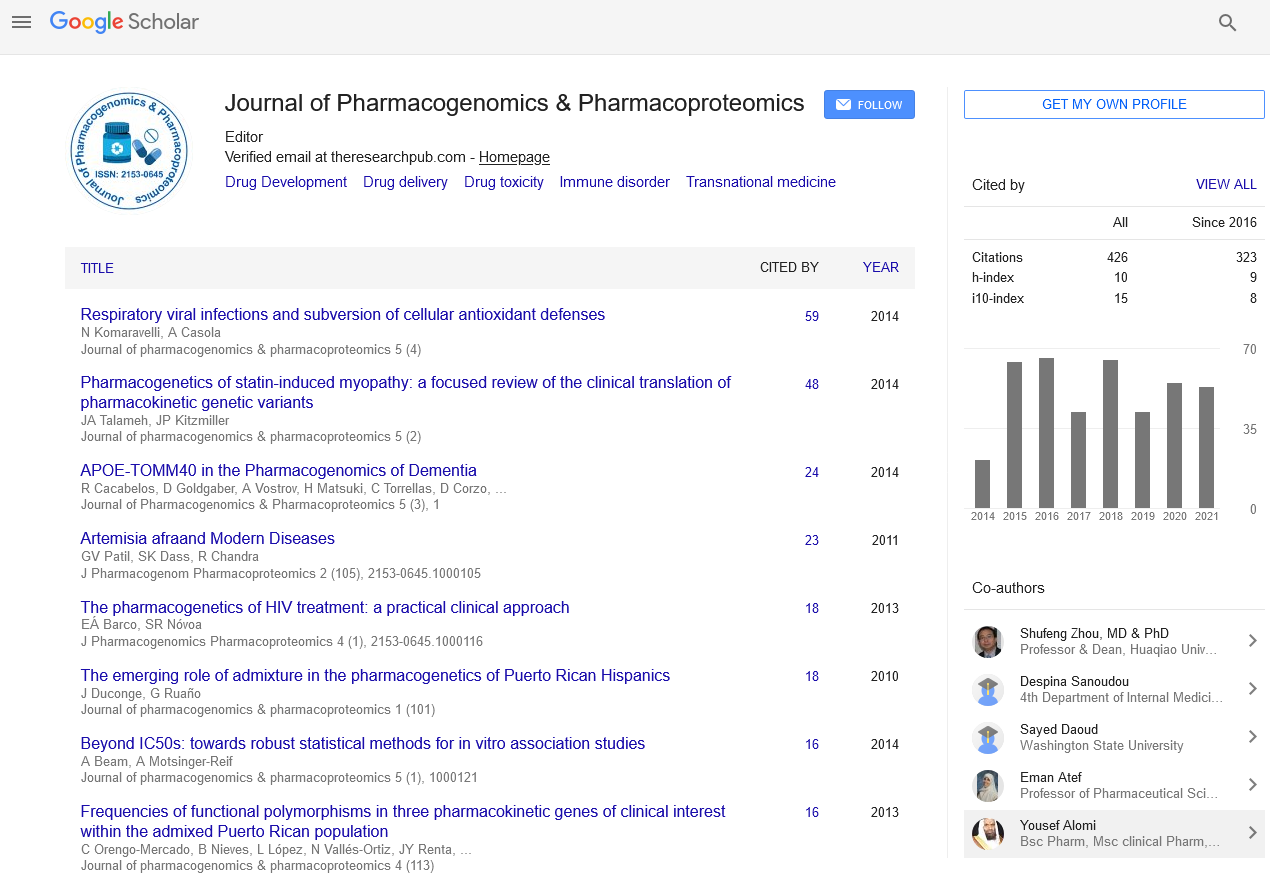Indexed In
- Open J Gate
- Genamics JournalSeek
- Academic Keys
- JournalTOCs
- ResearchBible
- Electronic Journals Library
- RefSeek
- Hamdard University
- EBSCO A-Z
- OCLC- WorldCat
- Proquest Summons
- SWB online catalog
- Virtual Library of Biology (vifabio)
- Publons
- MIAR
- Euro Pub
- Google Scholar
Useful Links
Share This Page
Journal Flyer

Open Access Journals
- Agri and Aquaculture
- Biochemistry
- Bioinformatics & Systems Biology
- Business & Management
- Chemistry
- Clinical Sciences
- Engineering
- Food & Nutrition
- General Science
- Genetics & Molecular Biology
- Immunology & Microbiology
- Medical Sciences
- Neuroscience & Psychology
- Nursing & Health Care
- Pharmaceutical Sciences
Serum S100B protein as a biomarker for prognosis in patients with malignant melanoma
JOINT EVENT ON 6th European Conference on Predictive, Preventive and Personalized Medicine & Molecular Diagnostics & 2nd World Congress on Human Genetics
September 14-15, 2017 | Edinburgh, Scotland
Paola Cardenas Rojas
National University of Colombia, Bogota, Columbia
Valencia Institute of Oncology, Spain
Scientific Tracks Abstracts: J Pharmacogenomics Pharmacoproteomics
Abstract:
Serum levels of S100B protein are widely used as a marker for malignant melanoma, and correlation between serum S100B and disease relapse and survival has been reported. During regular follow-up of patients with malignant melanoma transient elevation of serum S100B protein are observed but the clinical significance of this elevations is unknown. The primary aim of the study was to investigate the correlation between transient elevations of serum S-100B protein and the relapse risk of malignant melanoma. Between 2006 and 2015, 428 consecutive American Joint Committee on Cancer (AJCC) stage I, II, III clinically disease-free melanoma patients, with serum S100B evaluations and followed for at least 5 years were included in this retrospective study. Relapse occurred in 40.3% of the patients (n=174) during a median follow up period of 70 months. By univariate analysis, transient S-100B elevations were associated with significant relapse risk (p < 0.001). Multivariate analysis was performed adjusting for significant prognostic factors (ulceration and TNM) and the transient S100B elevations remained as a significant and independent prognostic factor for relapse (HR 3.18, 95% IC 1.89-5.37; p < 0.001). Transient S100B elevation is a significant and independent prognostic factor for relapse in melanoma patients. Therefore the S100B may be useful in the follow-up of disease free stage I, II and III melanoma patients and the detection of the elevated S-100B levels maybe lead to closer monitoring in follow-up and possibly earlier aggressive surgical or medical treatment of recurrences. To the authors knowledge, the current study is the first evaluation of the S100 B serum transient elevations as a prognostic factor for relapse.
Biography :
Paola Cardenas Rojas is a Dermatologist from National University of Colombia, Master in Public Health and Master in Cutaneous Oncology from Valencia University (Spain) at the Valencia Institute of Oncology. She is the director of the skin cancer program at Virrey Solis Hospital in Bogota Colombia. She works as an Associate Professor in the dermatology program at National University of Colombia. She has published more than 10 papers in reputed national and international journals.


